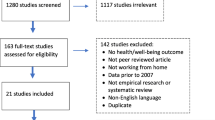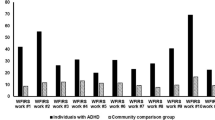Abstract
Purpose
This report describes the work functioning of schizophrenia patients receiving antipsychotic treatment in a rural south Indian community and examines the factors associated with it.
Methods
We assessed work functioning of 201 patients who have completed a minimum of 3 years of follow-up as part of a cohort study of schizophrenia patients receiving community-based treatment. ‘Work’ section of the Indian disability evaluation and assessment scale (IDEAS) was used to evaluate work-related disability at the time of recruitment and after a mean (SD) 47.0 (9.6) months of follow-up. Patients with moderate to profound work-related disability were compared with those with no or mild disability across socio-demographic and clinical variables.
Results
75 (37.3 %) were agriculturists; 58 (28.9 %) were pursuing household jobs; 28 (13.9 %) were daily wage labourers; 7 (3.5 %) were skilled labourers; 7 (3.5 %) were involved in other jobs. 26 (12.9 %) were not doing any sort of work. The proportion of patients with moderate or profound disability reduced from 137/201 (68.2 %) at baseline to 82/201 (40.8 %) at follow-up (p < 0.001). Work-related disability reduced significantly [mean (SD) work score on IDEAS was 2.2 (1.6) at baseline and 1.1 (1.2) at follow-up; t = −9.1; p < 0.001]. Logistic regression analysis showed that work-related disability was significantly associated with male gender, longer duration of illness, higher psychopathology and poor treatment adherence.
Conclusion
Nearly two-thirds of schizophrenia patients living in this rural south Indian community had satisfactory work functioning, a rate, which is substantially higher than rates reported from high-income countries. Agrarian work atmosphere and rural sociocultural milieu may have contributed to this in our sample. However, substantial proportion of patients remains considerably disabled. This highlights the need for concerted, community-level efforts to improve their functioning.

Similar content being viewed by others
References
Rossler W, Salize HJ, Os JV, Riecher-Rossler A (2005) Size of burden of schizophrenia and psychotic disorders. European Neuropsychopharmacol 15:399–409
Kruzban S, Davis L, Brekke JS (2010) Vocational, social and cognitive rehabilitation for individuals diagnosed with schizophrenia: a review of recent research and trends. Curr Psychiatry Rep 12:345–355
Ochoa S, Vilaplana M, Haro JM, Villalta-Gil V, Martínez F, Negredo MC, Casacuberta P, Paniego E, Usall J, Dolz M, Autonell J, NEDES Group (2008) Do needs, symptoms or disability of outpatients with schizophrenia influence family burden? Soc Psychiatry Psychiatr Epidemiol 43:612–618
Nunley M (1998) The involvement of families in Indian psychiatry. Cult Med Psychiatry 22:317–353
Srinivasan TN, Thara R (1997) How do men with schizophrenia fare at work? A follow-up study from India. Schizophr Res 25:149–154
Srinivasan TN, Rajkumar S, Padmavathi R (2001) Initiating care for untreated schizophrenia patients and results of one year follow-up. Int J Soc Psychiatry 47(2):73–80
Srinivasan L, Tirupati S (2005) Relationship between cognition and work functioning among patients with schizophrenia in an urban area of India. Psychiatr Serv 56:1423–1438
Krishne Gowda HR (2008) Rural development and co-operation. Spandana publishers, Bangalore
Sheehan DV, Lecrubier Y, Sheehan KH, Amorim P, Janavs J, Weiller E et al (1998) The mini international neuropsychiatric interview (M.I.N.I.): the development and validation of a structured diagnostic psychiatric interview for DSM-IV and ICD-10. J Clin Psychiatry 59(Suppl 20):22–33
Kay SR, Fiszbein A, Opler LA (1987) The positive and negative syndrome scale (PANSS) for schizophrenia. Schizophr Bull 13:261–276
Rehabilitation Committee of Indian Psychiatric Society (2002) Indian disability evaluation and assessment scale: a scale for measuring and quantifying disability in mental disorders. Indian Psychiatric Society, Kolkata
Thirthalli J, Venkatesh BK, Kishorekumar KV, Arunachala U, Venkatasubramanian G, Subbakrishna DK, Gangadhar BN (2009) Prospective comparison of course of disability in antipsychotic-treated and untreated schizophrenia patients. Acta Psychiatr Scand 119:209–217
Chatterjee S, Pillai A, Jain S, Cohen A, Patel V (2009) Outcomes of people with psychotic disorders in a community-based rehabilitation programme in rural India. Br J Psychiatry 195:433–4393
Subotnik KL, Nuechterlein KH, Ventura J, Gitlin MJ, Marder S, Marder S, Mintz J, Hellemann GS, Thornton LA, Singh IR (2011) Risperidone nonadherence and return of positive symptoms in the early course of schizophrenia. Am J Psychiatry 168:286–292
Mueser KT, Salyers MP, Mueser PR (2001) A prospective analysis of work in schizophrenia. Schizophr Bull 27:281–296
Patel V (2009) The future of psychiatry in low-and middle-income countries. Psychol Med 39:1759–1762
Deva P (2006) Psychiatric rehabilitation and its present role in developing countries. World Psychiatry 2006(5):164–165
Persons with disabilities Act. Available at: http://socialjustice.nic.in/search.php?cx=013656481690645681878:urfdi2mcdwc&ie=UTF-8&cof=FORID:11&q=persons+with+disability+act&btnG.x=13&btnG.y=10&btnG=Go (Accessed on 12 April 2011)
Acknowledgments
This project was funded by National Mental Health Programme, Government of India’s research grants to BN Gangadhar (2005–2007). The authors gratefully acknowledge the immense dedication shown by Drs SM Guggali, MN Naveen and Ms KV Suma in coordinating the project work.
Author information
Authors and Affiliations
Corresponding author
Rights and permissions
About this article
Cite this article
Suresh, K.K., Kumar, C.N., Thirthalli, J. et al. Work functioning of schizophrenia patients in a rural south Indian community: status at 4-year follow-up. Soc Psychiatry Psychiatr Epidemiol 47, 1865–1871 (2012). https://doi.org/10.1007/s00127-012-0495-8
Received:
Accepted:
Published:
Issue Date:
DOI: https://doi.org/10.1007/s00127-012-0495-8




